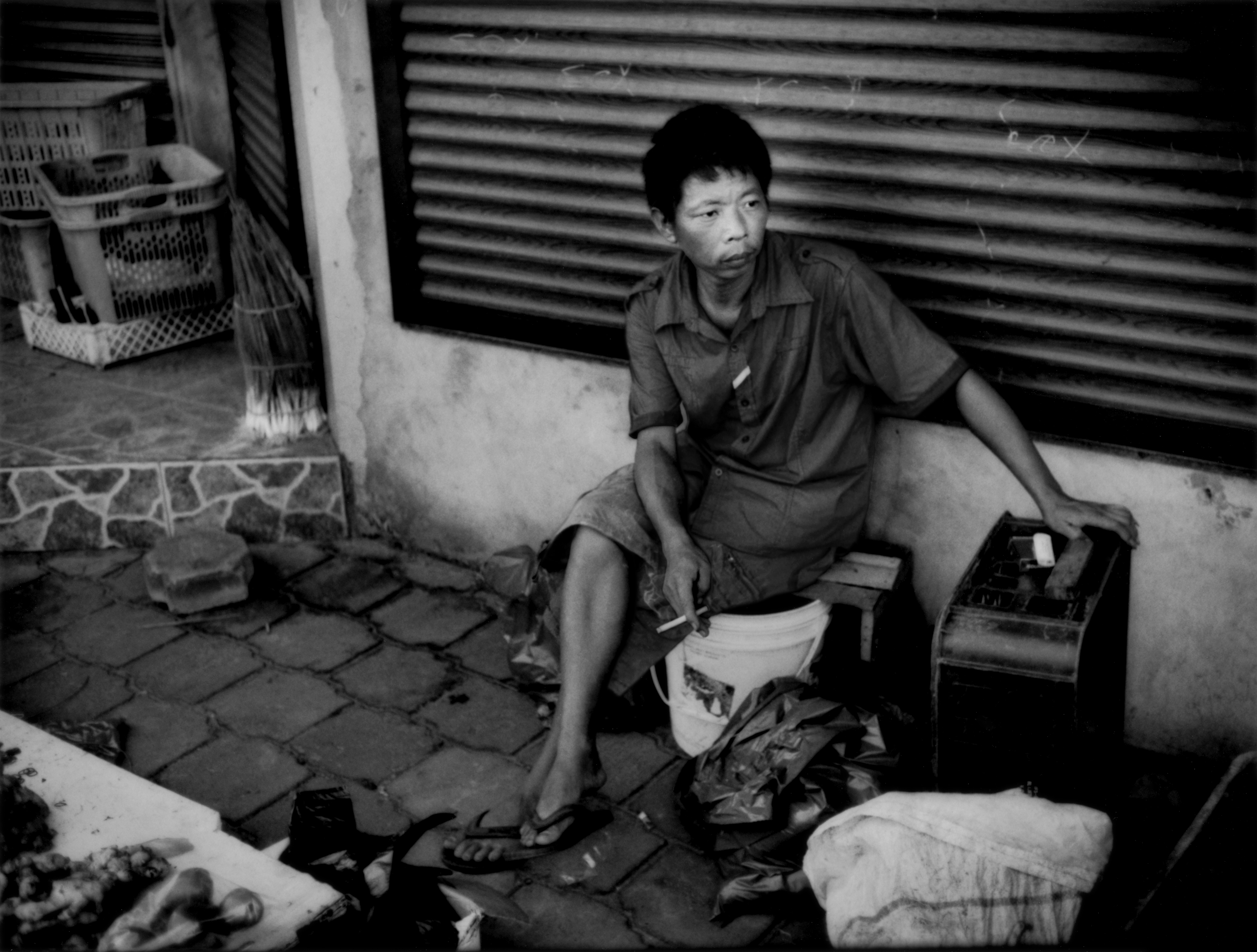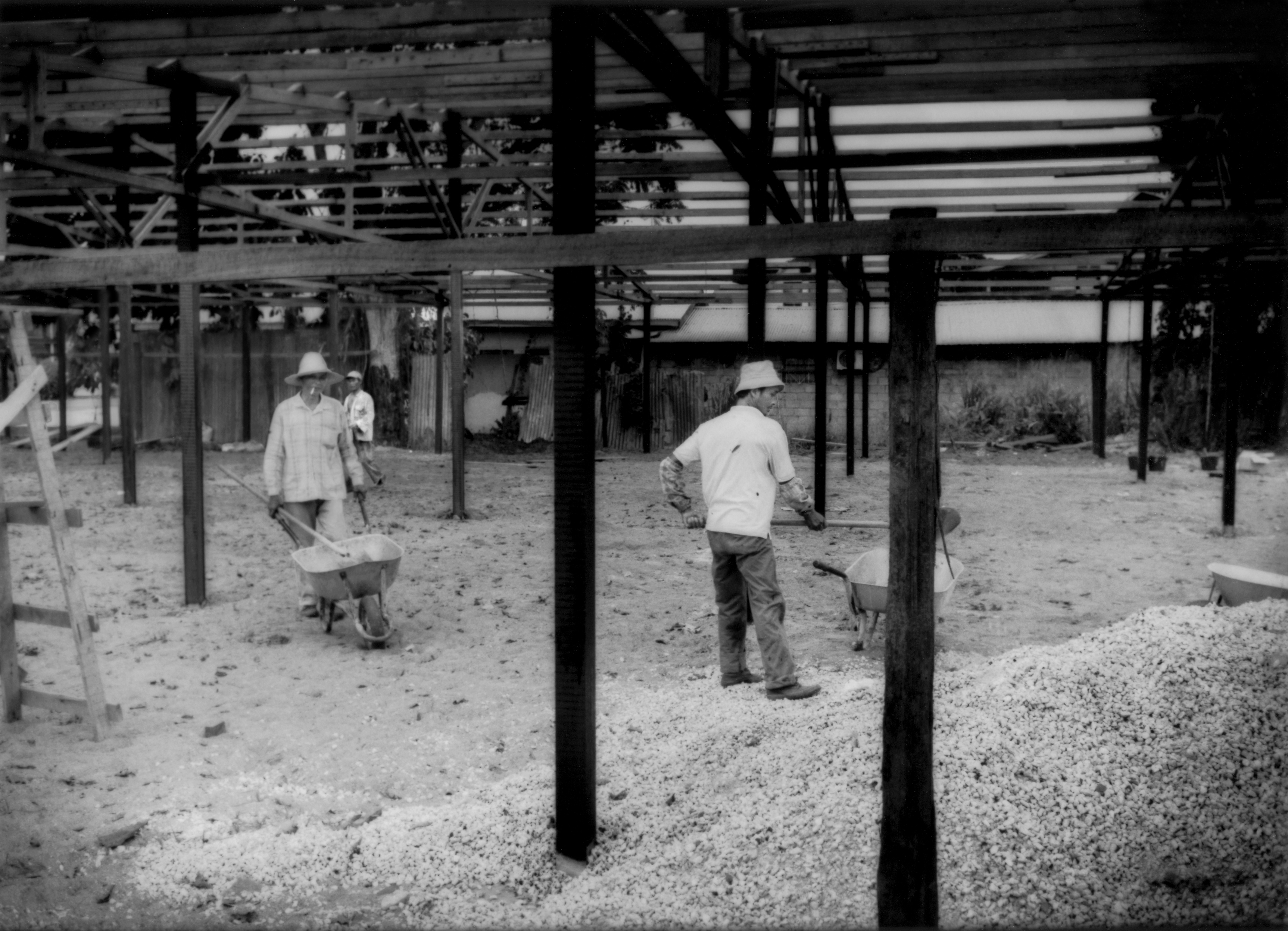
This is not a story about a Red Scare. It has a political component but, in the early stages, it seems more like a story about immigrant Chinese families trying to find opportunity and a better way of life in a small Amazonian country of half a million people, the former Dutch terrority now known as Suriname. That said, events took a familiar turn on my second day of reporting.
On the first day, Harvey, my Surinamese-Creole fixer/friend, and I went to a new Chinese market where in July 2011 I had photographed Chinese construction workers building in the center of the capital, Paramaribo. To be specific, these are not descendants of colonial-era immigrants—Surinamese-Chinese, Cantonese and Hakka—but recent immigrants from all over the vast People's Republic of China (PRC). A U.S. Embassy memo dated April 2007 and leaked by Wikileaks states that "large groups of Chinese enter the country via the western border with Guyana and receive driver's licenses, official documents and employment upon arrival through semi-legal or illegal channels. Unable to pay debts, they are de facto indentured labor, bonded to the organizations that brought them to Suriname."
And Radio Nederland quoted this leaked U.S. Embassy report from Wikileaks: "A 'reliable source' reported in 2004 that a delegation of the Chinese parliament during a visit to Suriname has examined the possibility of migration of thousands of Chinese to Suriname."
The presence of Chinese immigration is unmistakable. The only other immigrant group, which pales in comparison in the capital, would be Brazilians, whose country shares a border making entry logistics and cost immeasurably easier. According to World Bank figures, the annual per capita income in China is $4,260. With the sizeable gap between rich and poor there, rural migrants earn considerably less. Still, using the World Bank figure, an air ticket would take about 40 percent of the average Chinese person's income.
When I had photographed the construction of this market last July, not only was I surprised to see a large number of people from the PRC, but I was surprised to find Chinese labor widely used in a country known for cheap labor. In the market, we met a man I had also photographed at a different Chinese market, Mr. Ling, who suggested we drive west of Paramaribo to find some farms where produce is grown.
The first such Chinese agricultural operation was a small poultry farm across the street from a market in a predominantly Hindustani district. (South Asian Indian people are still referred to as Hindustani in Suriname.)
Two men from Zhejiang Province, south of Shanghai and famous for the historic city of Hangzhou, were tending to ducks that would eventually be sold as Peking duck in local Chinese markets. The odor from the droppings inside the covered enclosures was almost unbearable. Outside, a duck had drowned in a pond and had been left there. My pointing out the dead duck, which could poison the water, was met with a shrug. We progressed to where the men lived in utter squalor, with standing water infiltrating their sheet metal and wood dormitory shack. Malaria and dengue fever-bearing mosquitoes would find perfect breeding grounds there.
Further back along the road toward the capital, another immigrant family lived in a similar shack behind a Hindustani family's freshly painted, reinforced concrete home. Their living conditions and farmland were far more hygienic. Mr. Ong and his wife were from "Shanghai"--or the vicinity, as Chinese assume that a foreigner would not recognize village names. Mr. Ong was pleasant and outgoing and spoke the local lingua-franca, Suriname Tongo. Harvey could act as translator between Mr. Ong and me.
Mr. Ong cultivated a variety of greens native to China as well as mustard seed and various green beans. He has lived in Suriname for seven years, clearly loves the country, and takes satisfaction from farming.
Delano: "Mr. Ong, why do you love it in Suriname?"
Mr. Ong: "The reason I love Suriname is because of the weather. It is not cold (in winter) like China. You can work in the sun and only wear a shirt, and you won't get cold."
Delano: "Do you want to return to China or stay permanently in Suriname?"
Mr. Ong: "Right now, I want to remain in Suriname, but I do not know right now if I am going to return to China."
The interview went so well and Mr. Ong's Suriname Tango was so fluent that I decided to return the next day to continue the conversation. As I began to ask if he were willing to act as a hired Mandarin language translator, it was obvious that Mrs. Ong was none too pleased with Mr. Ong for having spoken so frankly with strangers the day before. Her demeanor betrayed her misgivings as she told me that she had feared I was some "inspector" for the "government." Trying to allay her fears, I shared with her my modest knowledge of the Chinese writing system, the language and knowledge of her hometown, but it was made clear that a foreigner and his camera were no longer welcome. This was hardly surprising. A foreigner toting a camera is shooed away in China with the regularity with which one could set a clock.
Not wanting to disturb the Ongs, we returned to the poultry farm a short distance away. There Harvey and I learned that the market, which usually bears the owner's family name, was not owned by the Munca family. This became apparent as the worried Chinese female shopkeeper emerged immediately, met our car, and flashed agitated looks across the street toward the poultry farm. We entered anyway and returned to the squalid, flooded shack deep in the property where we were met by one of the men from Zhejiang. He informed Harvey in rudimentary Suriname Tango that the shopkeeper "owned" the property and that they rented it from her. He then walked away. Craning my neck back toward the car parked in front of the market, I could see her frantically waving us away. Our presence was no longer welcome.
Part of reportage is adjusting to quick changes and new revelations. In a conversation with de Ware Tijd newspaper staff writer, Eleazer Pross, I learned that an agreement signed December 2010 between the government of Suriname and the People's Republic of China was voted down by the legislature. China had offered $6 billion to build a railroad, or road (it was never clearly stated to the public which it was), and a deep sea harbor in Paramaribo. This would have opened up one of the world's largest untouched rainforest wildernesses to rapid encroachment along the path of the railroad/road. "The Chinese demands were basically too much. They basically demanded the entire (interior) forest (for logging) as compensation for building the road," said Pross.
So, for the moment, the rainforest remains relatively secure, though this may simply represent the opening salvo in what could be a long negotiation, reminiscent of the ultimately unsuccessful struggle to halt the construction of the Three Gorges Dam in China. This pristine forest represents massive profits to loggers. It does state emphatically, though, that little Suriname can resist pressures from a giant, like China.
"China and Suriname," Pross continued, "will continue to cooperate, but on smaller projects."



